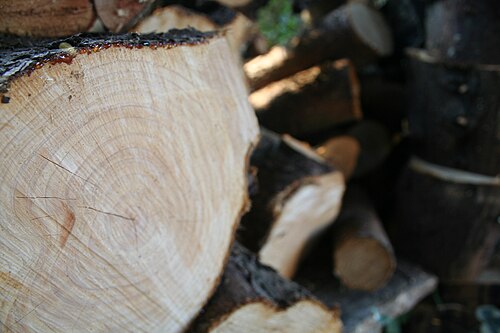Lumbernoun
Wood intended as a building material.
Lumbernoun
(UK) Useless things that are stored away.
Lumbernoun
(obsolete) A pawnbroker's shop, or room for storing articles put in pawn; hence, a pledge, or pawn.
Lumbernoun
A baseball bat.
Lumberverb
(intransitive) To move clumsily and heavily; to move slowly.
Lumberverb
To load down with things, to fill, to encumber, to impose an unwanted burden on
Lumberverb
To heap together in disorder.
Lumberverb
To fill or encumber with lumber.
Lumbernoun
A pawnbroker's shop, or room for storing articles put in pawn; hence, a pledge, or pawn.
Lumbernoun
Old or refuse household stuff; things cumbrous, or bulky and useless, or of small value.
Lumbernoun
Timber sawed or split into the form of beams, joists, boards, planks, staves, hoops, etc.; esp., that which is smaller than heavy timber.
Lumberverb
To heap together in disorder.
Lumberverb
To fill or encumber with lumber; as, to lumber up a room.
Lumberverb
To move heavily, as if burdened.
Lumberverb
To make a sound as if moving heavily or clumsily; to rumble.
Lumberverb
To cut logs in the forest, or prepare timber for market.
Lumbernoun
the wood of trees cut and prepared for use as building material
Lumbernoun
an implement used in baseball by the batter
Lumberverb
move heavily or clumsily;
Lumberverb
cut lumber, as in woods and forests
Lumber
Lumber, also known as timber, is wood that has been processed into beams and planks, a stage in the process of wood production. Lumber is mainly used for structural purposes but has many other uses as well.
Timbernoun
(uncountable) Trees in a forest regarded as a source of wood.
Timbernoun
Wood that has been pre-cut and is ready for use in construction.
Timbernoun
(countable) A heavy wooden beam, generally a whole log that has been squared off and used to provide heavy support for something such as a roof.
Timbernoun
The wooden stock of a rifle or shotgun.
Timbernoun
(archaic) A certain quantity of fur skins (as of martens, ermines, sables, etc.) packed between boards; in some cases forty skins, in others one hundred and twenty. Also timmer, timbre.
Timberinterjection
Used by loggers to warn others that a tree being felled is falling.
Timberverb
(transitive) To fit with timbers.
Timberverb
To construct, frame, build.
Timberverb
To light or land on a tree.
Timberverb
(obsolete) To make a nest.
Timberverb
(transitive) To surmount as a timber does.
Timbernoun
A certain quantity of fur skins, as of martens, ermines, sables, etc., packed between boards; being in some cases forty skins, in others one hundred and twenty; - called also timmer.
Timbernoun
The crest on a coat of arms.
Timbernoun
That sort of wood which is proper for buildings or for tools, utensils, furniture, carriages, fences, ships, and the like; - usually said of felled trees, but sometimes of those standing. Cf. Lumber, 3.
Timbernoun
The body, stem, or trunk of a tree.
Timbernoun
Fig.: Material for any structure.
Timbernoun
A single piece or squared stick of wood intended for building, or already framed; collectively, the larger pieces or sticks of wood, forming the framework of a house, ship, or other structure, in distinction from the covering or boarding.
Timbernoun
Woods or forest; wooden land.
Timbernoun
A rib, or a curving piece of wood, branching outward from the keel and bending upward in a vertical direction. One timber is composed of several pieces united.
Timberverb
To surmount as a timber does.
Timberverb
To furnish with timber; - chiefly used in the past participle.
Timberverb
To light on a tree.
Timberverb
To make a nest.
Timbernoun
the wood of trees cut and prepared for use as building material
Timbernoun
a beam made of wood
Timbernoun
a post made of wood
Timbernoun
land that is covered with trees and shrubs
Timbernoun
(music) the distinctive property of a complex sound (a voice or noise or musical sound);









